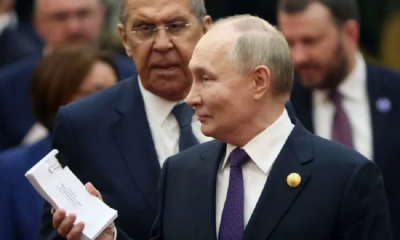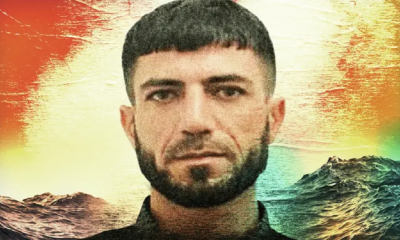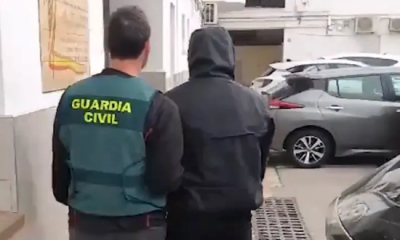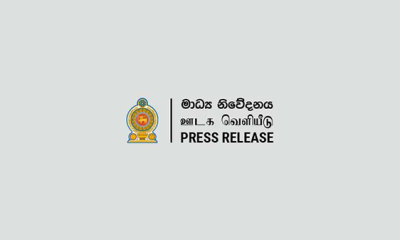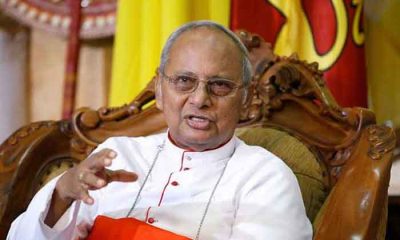Editorial
Some thoughts on Independence

When we saw an incoming email from a regular correspondent to the newspapers titled “Why not sing the National Anthem in the Thai language” in our inbox a couple of days ago, we naturally thought the writer had his tongue in his cheek. He was reacting to a news story in this paper last Sunday that the president had directed his Media Division to prepare the Independence Commemoration Souvenir in the Thai language in addition to Sinhala, Tamil and English to honour the visiting Thai premier. This was not actually the case. The letter writer was advocating a digital souvenir as an economy measure. He had incidentally suggested – seriously and not sarcastically – singing the anthem in Thai.
Be that as it may, given the country’s current travail with everything possible going wrong everywhere, many older people are heard to say “we might have been better off had we remained a British colony.” In that context it would be useful to reflect today, our 76th anniversary of Independence from British rule, some of the pros and cons of having been under the imperial yoke.
It would be foolish to regard the totality of British colonial rule over this island to have been of absolutely no benefit to us. Negatives undoubtedly abound, notably the notorious Waste Lands Ordinance No. 1 of 1897 declaring all uncultivated lands as state lands under this law. This resulted in the unjust deprivation of the country’s peasantry of commonly held grazing and forest land serving as rainwater catchments.
The sale for a song of such land to British investors to open first coffee and then tea plantations impoverished the Kandyan peasantry and deprived the whole country of the natural catchment of the forested hill country that fed our rivers, regulated the climate and much more. Then there was the brutal suppression of the Uva-Wellassa rebellion of 1817-18 and the scorched earth policy that followed and events that occurred in 1915 etc. There was also the administration of the country in a language most of its people did not understand and the ultimate horror of people being tried for their lives in such a language.
But on the plus side of the ledger was, as in India, uniting the whole country previously divided into several kingdoms, the legacy of the English language and the modernization of the economy with roads, railways, ports, hydro-power and urban infrastructure not forgetting the enforcement of law and order. Colonialism, as everywhere, was exploitative but not without at least some fringe benefits for colonized territories. This was more true of the British than the other colonial powers.
The period between 1931 and 1947 leading up to Independence when the country was governed by two State Councils under British overlordhip saw the opening of the dry zone which arguably was bigger than the Mahaweli Development project that came later. We had universal franchise in 1931 with women getting the right to vote only three years after females had won that right in the United Kingdom.
At the time of Independence, then Ceylon was a jewel in the crown of the British Empire and ours was arguably one of the strongest economies, other than Japan’s, in Asia. It is very well known that Singapore’s Lee Kuan Yew once held then Ceylon as a model for his country to emulate. That was then, but where are we now after 76 years of self-rule?
The blame for much of our failures must be squarely laid at the feet of the various post-Independence governments who have ruled us since we were freed of the colonial yoke. The Soulbury Constitution the British left us served us well for 26 years. But our political class with their lack of wisdom threw out the baby with the bathwater. The clause protecting minority rights ended with the 1972 constitution which accorded primacy to Buddhism, the religion of the majority. Sinhala Only was Mr. Bandaranaike’s battle cry but as Tarzie Vitachchi, one of our best known newspapermen so pungently put it, the prime minister later tried to add “but Tamil also” to that slogan!
As Prof. KM de Silva, one of our best known contemporary historians has noted, the 1972 constitution ought to have been a proper manifestation of the people’s sovereignty. But it was written with minimum public participation. As he pointed out, by promulgating the new constitution, the then ruling coalition elected by a landslide in 1970 gave itself a term up to 1977, two years beyond the five years to which it was elected in 1977.
But the J.R. Jayewardene government, elected in 1977 with an unprecedented five sixths parliamentary majority did better, doing away with the next election “with the consent of the people” obtained via what was widely regarded as a heavily rigged referendum. This enabled the then incumbent parliament to remain in office for a further term without an election. But as KM de Silva has said, the system we have been left with “may be described as a centralized democracy in which the most dominant element is the political executive which in comparison with the former constitution has fewer built-in checks on the abuse of political power.”
The various missteps since Independence led to a near 30-year civil war, a bankrupt country with an obscenely bloated public service and a military that is the world’s 14th largest. Jobs for the boys (and girls) of politicians has resulted in our public service being over five times as big as it needs be. Our youth is quitting the country in their thousands as they see no future here as we prepare for yet another election with little prospect of the widely desired system change.
Editorial
Threats, hubris and flippancy

Friday 6th February, 2026
Some Opposition big guns went ballistic yesterday in Parliament, lashing out at the JVP-NPP government for refusing to provide SJB MP Rohana Bandara with security in view of threats to his life. They have been urging the government to ensure the protection of MP Bandara, but in vain. It looks as if the eminences grises of the JVP remote-controlled the national legislature.
The government MPs made some facetious remarks about MP Bandara’s demand for security. Their flippancy is deplorable. Gun violence is on the rise, and hardly a day passes without a fatal shooting in this country. Underworld gangs have amply demonstrated their ability to strike anywhere at will. The police swing into action only after crimes are committed.
The police first made a proper threat assessment and concluded that MP Bandara should be provided with security. The government, which had made light of his complaint, was left with egg on its face. It disregarded the police report and sought to obfuscate the issue. While it was drawing fire in Parliament for the inordinate delay in taking action to protect MP Bandara, the police issued a counter-report, reversing their earlier threat assessment, and, lo and behold, claimed that the threats to the MP emanated from a rival in his own party. Obviously, the government pressured the police to make an about-turn and help give a political twist to the issue. The police have earned notoriety for their absurd claims, which are legion, and trotting out lame excuses in defence of their political masters.
Opposition Leader Sajith Premadasa yesterday chided the government frontbenchers for flippancy and making a false claim that MP Bandara had received threats from someone in his own party. He said a Deputy Inspector General of Police in Anuradhapura and intelligence services had initially recommended that MP Bandara be given adequate security. But the government members continued to crack themselves up. Ruling party politicians behave in this manner when power goes to their heads.
The Opposition MPs are in a dilemma where their security is concerned. When they face threats and ask for protection, the Speaker says the government goes by threat assessments done by the police in deciding whether to provide them with security. The police do as the government says, and issue reports justifying its position that there are no threats to its political rivals. Thus, the Opposition MPs have no one to turn to when their lives are in danger. The government MPs are apparently deriving some perverse pleasure from MP Bandara’s predicament.
Let the government be warned that it is making a big mistake by refusing to provide MP Bandara with security. Sri Lanka is no stranger to political assassinations. The JVP itself has gunned down hundreds of its political rivals. The UNP, the SLFP, etc., too, have a history of political violence, which claimed many lives. Those who do not learn from history are said to be doomed to repeat it. One may recall that an assassin’s bullet that pierced DUNF leader and former Minister Lalith Athulathmudali’s heart in April 1993 became the undoing of a UNP government. That repressive regime disregarded the then Opposition’s demand that the UNP dissidents be provided with security as they were facing threats to their lives from the LTTE as well as pro-UNP goons.
Most of all, a fundamental democratic and legal norm underpinning modern parliamentary systems is that all members of Parliament are equal in rights and privileges and must be treated as such. It is unbecoming of a government to dismiss threats to an Opposition MP’s life, and make flippant remarks, which reflect poorly on it.
Editorial
All’s not well that ends well?

Thursday 5th February, 2026
The argy-bargy is done, and the battle’s lost and won, one might say with apologies to the Bard. A prolonged tug of war between President Anura Kumara Dissanayake and the Constitutional Council (CC) has come to an end. The newly reconstituted CC has unanimously approved President Dissanayake’s nominee for the post of Auditor General (AG). The National Audit Office (NAO), which remained headless for months, now has a new head—Samudrika Jayaratne, who has served as Senior Deputy Auditor General. But the question is whether one can truly say, in this case, all’s well that ends well.
We do not intend to raise suspicions about the integrity of the new AG, but there are some questions that warrant answers. The critics of her appointment have levelled some allegations against her, including transactions tainted by conflict of interest and ‘unprofessional conduct’. They have also claimed that the Commission to Investigate Allegations of Bribery or Corruption has launched an investigation into allegations against her. Unsubstantiated as these allegations are, they have the potential to raise doubts in the public mind about the new AG’s integrity and that of the NAO under her. Hence the need for her to respond to them.
Thankfully, President Dissanayake’s efforts to parachute a total outsider loyal to the JVP into the post of AG came a cropper because the immediate predecessors of the three newly appointed civil society members of the CC intrepidly resisted pressure from the Executive. However, the government ought to explain why it overlooked Dharmapala Gammanpila, who served as the Acting AG. The general consensus is that he is the most eligible candidate for the post of AG. Four Mahanayake Theras wrote a joint letter to President Dissanayake, recently, urging him to appoint Gammanpila as AG. The prelates’ request resonated with those who cherish good governance, but President Dissanayake ignored it.
The JVP-led NPP’s election manifesto, A Thriving Nation: A Beautiful Life, attributes the deterioration of the public service to ‘political appointments’ and ‘state workers making political decisions’. Among the steps the NPP has promised to take to straighten up the public service are ‘merit-based appointments and promotions’. But its refusal to appoint Gammanpila as AG has raised many an eyebrow and lent credence to its critics’ claim that it is wary of having an upright official at the helm of the NAO because it does not want various fraudulent deals in the public sector on its watch exposed; some of them are the questionable release of 323 red-flagged freight containers without mandatory Customs inspections from the Colombo Port and the rice and coal scams. The only way the government can show that the merit principle it claims to uphold has not fallen by the wayside and its commitment to good governance is genuine is to give credible reasons for its decision to overlook the most eligible candidate for the post of AG.
The heads of all state institutions must be above suspicion like Caesar’s wife, so to speak, for a fish is said to rot from the head down. One may recall that the Police under Deshabandu Tennakoon, whom the SLPP-UNP government appointed IGP by unashamedly subverting the CC process amidst protests, became subservient to the then rulers. Sadly, the situation has not changed much; the long arm of the law has become a cat’s paw for the JVP-NPP government. While claiming to uphold good governance, the incumbent government has embarked on a campaign to vilify the Attorney General in a bid to pressure him to obey its dictates. Thankfully, he has proved that he is made of sterner stuff, and his staff, the Bar Association of Sri Lanka and others have circled the wagons around him.
Meanwhile, the CC’s unanimous endorsement of the appointment of the AG has diminished the Opposition’s moral right to criticise the actions of the NAO under the new head.
Editorial
The dawn of another Independence Day

Wednesday 4th February, 2026
Another Independence Day has dawned. Elaborate arrangements have been made to celebrate it on a grand scale. The national flag will flutter at full mast majestically to the roll of drums and the blare of trumpets. A colourful parade and a fly-past will be among the day’s many attractions. A ceremony with such pomp and circumstance is an occasion for reflection.
Sri Lanka is celebrating the 78th year of Independence while emerging from its worst-ever economic crisis. There is a long way to go before it achieves full economic recovery. Much is being spoken about the need for economic reforms, and their importance cannot be overstated. But the question is whether they alone will help usher in national progress.
Since 1948, Sri Lanka has seen various political and economic reform movements. Its economy and political system have undergone radical changes during the past several decades. and reforms have yielded mixed results, with progress in some areas and setbacks in others. The current economic crisis and the ongoing recovery efforts have necessitated a national strategy to reform the economy. Experiments with political, constitutional and electoral reforms are far from over.
Successive governments have experimented with economic and political reforms. On the political front, the executive presidential system has survived several half-hearted attempts to abolish it and reintroduce the Westminster system. Politically-motivated amendments have made the Constitution look like a badly edited periodical, according to cynics. The electoral system has become an unholy mess. Provincial Council elections have fallen between two electoral systems, so to speak; at present, they cannot be held under either the Proportional Representation system or the Mixed Proportional system.
Meanwhile, the blame for the sorry state of affairs on all fronts has been laid solely at the feet of politicians. But it should be apportioned to the people, for it is they who elect governments. They vote in such a way that one wonders whether they are capable of making rational decisions and choices despite the country’s high literacy rate. True, politicians deserve the flak they receive for corruption, other malpractices and, above all, the country’s failure to achieve development, but it takes two to tango.
The state service has earned notoriety for inefficiency, incompetence, and delays. Decades of politicisation alone cannot be blamed for this situation. Sri Lankans’ attitude to work leaves much to be desired. The country is yet to develop a strong national work ethic, which is a prerequisite for enhancing national productivity and achieving development. Trade unions perennially make demands but rarely turn the searchlight inwards, much less concentrate on their duties and responsibilities.
The public apparently does not care much about civic duties and responsibilities. Tax compliance is extremely low, and indiscipline is widespread. Roads are characterised by utter chaos, and accidents, mostly caused by reckless driving, claim about seven or eight lives a day. Complaints of sexual harassment of women in buses and trains abound.
The focus of the government, the Opposition, the media, religious leaders and others is currently on educational reforms, which have apparently taken precedence over economic reforms. There are media reports about discussions on constitutional and electoral reforms as well. But there has been no serious discussion on the much-needed social reforms.
Social reforms are organised efforts aimed at not only promoting justice, equality and inclusion across political, economic, cultural and social spheres in a country but also helping bring about attitudinal changes and positive mindsets essential for a nation to adapt to changing times, face challenges, achieve its development goals and progress. It is time serious thought was given to social reforms.
-

 Business6 days ago
Business6 days agoHayleys Mobility ushering in a new era of premium sustainable mobility
-

 Business3 days ago
Business3 days agoSLIM-Kantar People’s Awards 2026 to recognise Sri Lanka’s most trusted brands and personalities
-

 Business6 days ago
Business6 days agoAdvice Lab unveils new 13,000+ sqft office, marking major expansion in financial services BPO to Australia
-

 Business6 days ago
Business6 days agoArpico NextGen Mattress gains recognition for innovation
-

 Business5 days ago
Business5 days agoAltair issues over 100+ title deeds post ownership change
-

 Editorial6 days ago
Editorial6 days agoGovt. provoking TUs
-

 Business5 days ago
Business5 days agoSri Lanka opens first country pavilion at London exhibition
-

 Business4 days ago
Business4 days agoAll set for Global Synergy Awards 2026 at Waters Edge


